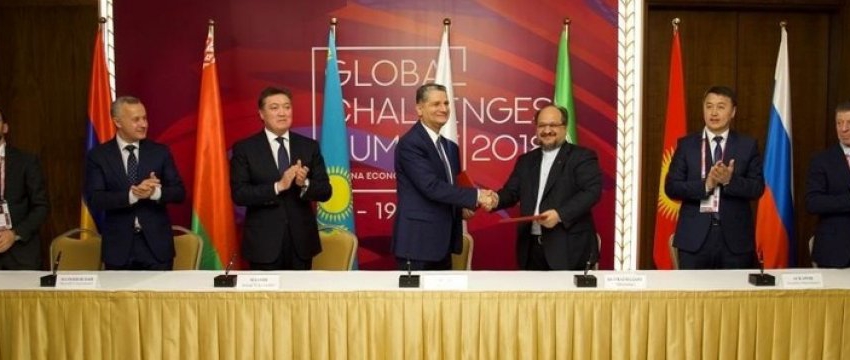Wednesday 29 August 2018 - 15:57
Story Code : 317618
Iran, EEU to engage in all-embracing free trade by early 2022
The Russian Ministry of Industry and Trade also told Izvestia that the interim free trade zone agreement signed in May 2018, which precedes the transition to a full-fledged agreement, covers 50% of the trade between the parties and will enter into force in early 2019.
According to the deal, Iran, which is not a member of World Trade Organization, will assume obligations stipulated by this organization, which will make its trade with EEU members more transparent and predictable.
�After the expiration of the three-year period, plans are in store to transition to a full-format agreement on a free trade zone, which will cover all commodities. Negotiations on the transition to the new agreement should be started no later than a year after the interim agreement enters into force,� the Russian ministry said.
The deal�s main advantages, the ministry noted, is a reduction in import duties and the formation of a �transparent and predictable trade environment�. This will be because all countries, including Belarus and Iran, which are not members of WTO, have agreed to adhere to the rules of this organization.
The experts interviewed by Izvestia were upbeat on the prospects of the free trade zone deal between EEU and Iran. In their opinion, the zone will be beneficial for all parties, especially given the US sanctions against Moscow and Tehran, which are driving both to trade with each other and economic rapprochement.
�In the context of sanctions, the temporary agreement on the free trade area will partially compensate for Russia�s losses in the US market. The Iranian market is an alternative for deliveries of Russian metals, especially since the territorial proximity significantly reduces the cost of transportation,� Vyacheslav Kholodkov, the head of the Center for CIS Countries Studies, told Izvestia.
EEU was established in 2015 based on the Customs Union of Russia, Kazakhstan and Belarus, and was later joined by Armenia and Kyrgyzstan. In 2016, Vietnam officially became the first non-regional country to join the bloc�s free trade zone, which is designed to ensure the free movement of goods, services, capital and workers.
Since then, more than 40 countries and international organizations, including China, Indonesia, South Korea, Egypt and India, as well as some South American countries, have expressed interest in a free-trade deal with EEU.
Iran�s non-oil commercial exchanges with the five member states of the Eurasian Economic Union totaled $1.69 billion during the last Iranian fiscal year (March 2017-18), to register a decline of 35.38% compared to the year before, according to data released by the Islamic Republic of Iran Customs Administration. Iran�s exports to EEU stood at $837.18 million during the period, indicating a 6.51% year-on-year increase.
Imports amounted to $858.02 million, down 53.3% YOY.
Iran�s total commercial exchanges with Russia were the highest in terms of dollar value among the five member states of the bloc at $1.03 billion, down 42.14% YOY.
# Tags











